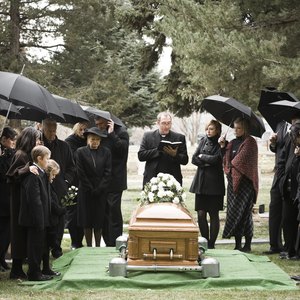
When someone dies, the procedure for paying any debts they left behind is normally clear cut. The estate in question typically takes care of it as part of probate. This simple equation becomes more complex, however, if the deceased lived in a community property state. Texas is an example of a state where such laws apply. To further complicate matters, Texas legislation recognizes more than one kind of community property, but relatives rarely shoulder the responsibility of paying a deceased's debt.
Tips
Generally speaking, the relatives or spouse of a decedent will not be required to pay back their loved one's debts. One of the only possible exceptions to this could be if you co-signed on an account with the deceased individual.
Responsibilities of Relatives
Under federal law, relatives such as siblings, children or parents are almost never responsible for paying a loved one's debts after his death. This is true even in community property states such as Texas. An exception exists, however. If you co-signed on an account with the deceased, the creditor can legally look to you for payment. Debt collectors can contact relatives, but only once. Under the terms of the Fair Debt Collection Practices Act, they can call family to ask for contact information for the estate, but they can’t discuss the details of the bill in question, and they can't try to bully you into paying the debt yourself.
Understanding Probate Law
An executor is the person named in a decedent's will to settle his estate; an administrator is appointed by the court to perform the same job if the deceased doesn't leave a will or if he doesn't name an executor in his will. These individuals take over responsibility for the deceased's debts as part of the probate process. If you're appointed as executor or administrator, your tasks typically include marshaling the deceased's assets, notifying his creditors that the estate is in probate, paying legitimate creditor claims, and distributing any remaining property or assets to beneficiaries and heirs. It's sometimes necessary to sell or liquidate some of the deceased's property to make estate ends meet and to ensure that as many creditors as possible are paid.
Community Property Law
If the deceased was married at the time of their death, this changes the complexion of their estate significantly, particularly in Texas. When gathering their assets, the executor or administrator of his estate must determine which are their separate property and which are community property. Their separate property, typically anything that they acquired before their marriage or by gift or inheritance, is part of the estate and is subject to liquidation to pay debts. Under Texas law, their community property is everything else they owned, and this is also available to satisfy creditors' claims.
Texas also recognizes the concept of "special" community property. This includes assets acquired during the marriage, but which only one spouse had control over. The executor or administrator can liquidate or use the deceased's special community property to pay their debts, but their spouse's special community property typically cannot be accessed. Their spouse's separate property is also safe. If the deceased's spouse inherits an asset that's encumbered by a loan, they typically take ownership of the asset as well as responsibility for the debt.
Researching Insolvent Estates
Texas law provides for an order of priority in which the executor or administrator must pay the decedent's bills, beginning with his funeral costs and expenses incurred from his last illness and ending with "all other claims." These typically include unsecured creditors such as credit card lenders. If the decedent's estate is insolvent, meaning they simply didn't own enough property to cover all these debts – creditors at the end of the line will not receive payment.
Beneficiaries typically receive nothing in this case, no matter what the deceased's will says about bequests. His spouse and minor children are an exception to this rule because they might receive a living allowance from the estate approved by the court. This money comes off the top of the estate before anything else is paid. If it turns out later that the estate is insolvent, the surviving spouse or the decedent's minor children do not have to return the money to the estate and, by extension, to the deceased's creditors.
References
- Houston Bar Association: Count Creditor's Among Estate's Survivors
- James M. Bright and Associates: What Happens to Debts When a Spouse Dies?
- Federal Trade Commission: Debts and Deceased Relatives
- Texas.gov: Community Property
- Legal Assistance for Military Personnel. "Powers of Attorney." Accessed April 13, 2020.
- IRS. "Deceased Taxpayers – Understanding the General Duties as an Estate Administrator." Accessed April 13, 2020.
- Wayne County Probate and Juvenile Court. "Full Administration With and Without A Will." Accessed April 13, 2020.
- Michigan Legal Help. "An Overview of Informal Probate." Accessed April 13, 2020.
- California Courts. "Simplified Procedures to Transfer an Estate." Accessed April 13, 2020.
- AARP. "10 Things You Should Know About Living Trusts." Accessed April 13, 2020.
- Florida Bar. "Consumer Pamphlet: Probate In Florida." Accessed April 13, 2020.
- Cornell Law School Legal Information Institute. "Right of Survivorship." Accessed April 13, 2020.
Writer Bio
Beverly Bird has been writing professionally for over 30 years. She is also a paralegal, specializing in areas of personal finance, bankruptcy and estate law. She writes as the tax expert for The Balance.

